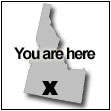
10. O.K. Computer - Radiohead
Here I am at the end of this list, and I think that it may be safe to say that I'm an acoustic kind of guy. In fact, I may never have broken out of that niche if it hadn't been for a fellow barista I worked with at a coffee shop in Tucson. I don't even recall the guy's name now; turnover was a bit high at that job, poor management, crappy hours, etc., but the coffee was awesome. Anyhow, it was summer in the desert and I was working weekends at the coffee shop and teaching a Rock and Roll history class at the university during the week. I got talking with this dude, Chad?, Chip?, Ryan?...?, and he asked me what I thought about Radiohead. This is the point at which the Rock and Roll teacher (namely, me) realized that he was terribly out of touch with the here and now. "Radiohead? Yeah, they're great...I don't really know their stuff though." In fact, I hadn't even heard a Radiohead album and was only familiar with a handfull of singles. So, I asked him what his favorite Radiohead album was and he replied, "O.K. Computer." Once again, my life changed.
The thing is, I had friends in college that raved about Radiohead and scoffed when I acted aloof. But at that time I was perfectly content in my little Dave Matthews colored world and had no interest in a band that seemed so, well...produced. And the other thing is, I'm often an idiot about these things, thinking that if it was such great music, I surely would be familiar with it, rock snob that I was. Truth be told, I was a sham of a rock snob before I finally listened to O.K. Computer. It was frightening. From start to finish, it was perfect and complex and beautiful, and it had been out there for nearly a decade before I listened to it. So there I was, faced with a classroom full of university students who no doubt would make me for the square I was because of my prevailing ingnorance in all things Rock. That's a little drastic I suppose, but I certainly felt that way. O.K. Computer was genius, a real album made by real musicians. My qualms about Radiohead being too produced fell away and I embraced all the electronic wonders they had to offer.
So, my musical journey to the here and now being complete, I find that I still have much to say. Especially about the years since O.K. Computer and Radiohead woke me up from my Rock Snob Dream and led me to Rock Snob Reality. What I know now is that there is far more excellent music out there than I'll ever have the time or resources for. Nevermind what everyone says I should listen to...I'll just keep stumbling upon gems here and there, whether I'm searching for them or not (example: just in the last two weeks I've discovered Beck's Sea Change and a brand new album called The Bird and the Bee, both of which have incredibly lavish production and infectious melodic content; I could just sit and listen for hours and hours...). So stay tuned, the list may be done, but as Karen Carpenter so aptly sang, we've only just begun.







